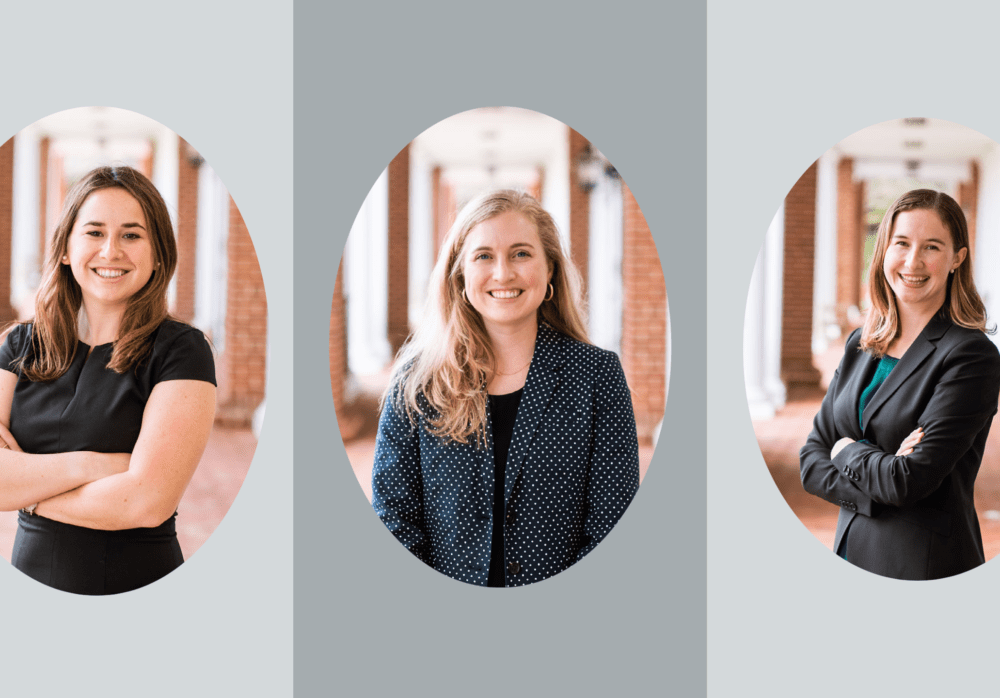Today on the blog we check in with our enrolled Future Year Scholars to hear their thoughts on the value of gaining a few years of professional work prior to starting an MBA program. Darden Admissions recently caught up with a few of Darden’s enrolled Future Year Scholars to learn more about the value of pre-MBA work experience.
Q: The Future Year Scholars program requires students to work between 2 and 4 years prior to matriculating to the MBA program. How has your pre-MBA work experience added value to your MBA experience?
Personal Development
“Honestly, there are a lot of things. I think it is nice to take a step back from undergrad and gain perspective on how the world works, especially the business world before returning to school. After three years of consulting experience, I have a decent set of business skills that have transferred well into recruiting — from being able to do a networking call, to sending a cold e-mail, to being comfortable talking to people. If I had come straight from undergrad, I’m not sure I would have been as comfortable with recruiting. — Morgan Klausner (Class of 2022)
Defining Your Purpose
“Getting work experience helps you figure out what you like and what you don’t like. Often times if you have an internship in undergrad, you can get a really small sense, but once you are doing it every day for a long time, you get a more detailed look at it, and that was helpful to learn what I wanted to do longer term. I worked on different products and different markets and used that information to shape my career goals.” — Amanda Hedgecock (Class of 2022)
When it comes to the number of years of work experience, that period of two to four years is really important for figuring out where you want to go. I’m a pretty firm believer that it is helpful to have a direction when you get here, just because everything goes really quickly, and if you’re trying to do everything you end up doing nothing. I was in consulting, so I was on 12 different projects over the course of 3 years. Had I not had that many opportunities to try different things, maybe I would have taken another year to figure out what I liked and didn’t like. I had three years and I thought that was enough to enroll. I think what you lack in experience you can make up for in passion and perspective, so while I may not have had 7 years of experience or 3 different jobs under my belt, I have developed perspective during the time that I did work, and I can bring that to the table that might make up for my lack of years or specific jobs. — Lindsay Bralower (Class of 2022)
Preparing You for the Classroom
“Work experience really helps you in class, as well. Recently we did a case about the global incident recovery team at a tech company, and I spoke up more than usual because that is what I did for two years. People were asking me a lot of questions, as I was able to bring the real world perspective to the case we were looking at.” — Amanda Hedgecock (Class of 2022)
Preparing You for Recruiting
When you’re interviewing with companies, naturally a recruiter is going to want to know how your past experiences have positioned you for the situations you are going to be in in whatever role and being able to speak to that in a business setting is much more powerful, so I think it helps you in the recruiting sense, because interviews are just storytelling, so you have to think about which aspects of your experience are relevant and getting that work experience gives you a much larger pool to draw upon. — Amanda Hedgecock (Class of 2022)
Complementing Your Education
“Undergraduate business schools are really theoretical. Students don’t have work experience, so it’s more about talking about ideas and concepts and learning some tangible hard and soft skills. When you get to business school, it is so much more practical with the case method and learning teams and our assignments. Because you have already had that experience you know what situations are like and how you might actually have to handle them, so you go from talking about it to actually doing it which is a big difference. I felt like undergraduate business school prepared me extremely well for the job that I did out of undergrad, but not necessarily gave me an advantage for business school. If anything, I felt like my work experience gave me a leg up for business school in that I was doing very business oriented things already that reserved a lot of quantitative and qualitative skills where I had peers that came from TFA or music teachers, so if anything it’s my job that prepared me and not my undergraduate degree. — Lindsay Bralower (Class of 2022)
See more from our fourth Future Year Scholars panelist Zak DePasquale in his recent featured blog post, Making Pivots and Achieving Goals Through Deferred MBA Opportunities.
The final 2021 application deadline is 7 June, but there’s still plenty of time to gather your materials and get started!
Be sure to consult the Latest News regularly for the most updated news releases and media hits. Check out faculty thought leadership published on Ideas to Action. And stay connected with us via social media: Facebook, Instagram, LinkedIn, Twitter, WeChat





